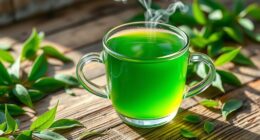To manage night sweats naturally, create a cool, ventilated sleep environment by adjusting the thermostat and using fans or cooling accessories. Wear lightweight, breathable clothes, and choose natural fiber bedding to stay dry. Incorporate relaxation techniques like meditation or gentle yoga to reduce stress triggers. Focus on a balanced diet rich in soy, omega-3s, and plant-based foods, and stay hydrated with cold fluids. Explore these tips further for effective relief.
Key Takeaways
- Create a cool, well-ventilated sleep environment with temperature control, breathable bedding, and cooling accessories.
- Wear lightweight, moisture-wicking clothing and use cooling pillows or pads to dissipate heat.
- Practice relaxation techniques like mindfulness, deep breathing, and gentle yoga to reduce stress-induced night sweats.
- Incorporate a plant-based, Mediterranean diet rich in omega-3s, soy, and fiber to support hormonal balance and decrease hot flashes.
- Limit spicy foods, caffeine, and alcohol, stay hydrated with cold fluids, and use herbal supplements after consulting a healthcare provider.
Natural Remedies to Calm Hot Flashes
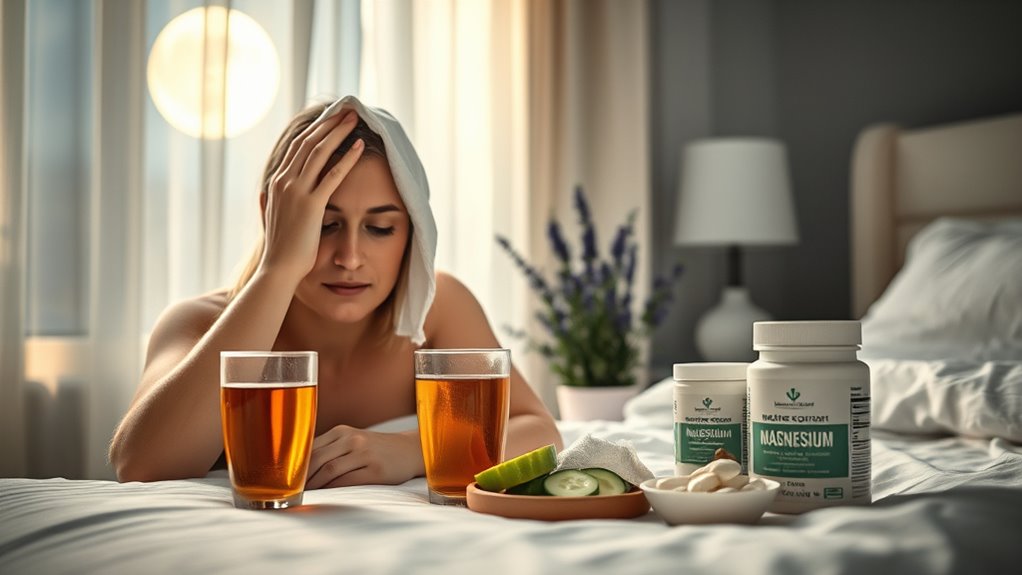
Many women seek natural ways to manage hot flashes, turning to remedies that promote relaxation and reduce stress. Yoga and meditation are effective options, helping you relax and regulate your nervous system responses that trigger hot flashes and sweating. These practices also improve your mood and decrease anxiety, making symptoms easier to handle. Breathing exercises and mindfulness techniques are simple, risk-free tools you can use anytime to calm your body. Incorporating these methods consistently enhances your overall menopausal comfort. While some turn to herbal remedies like soy isoflavones, red clover, or black cohosh, research shows their benefits are limited and vary among individuals. Combining relaxation techniques with healthy lifestyle adjustments offers a practical, natural approach to easing hot flashes.
Creating a Cool and Comfortable Sleep Environment
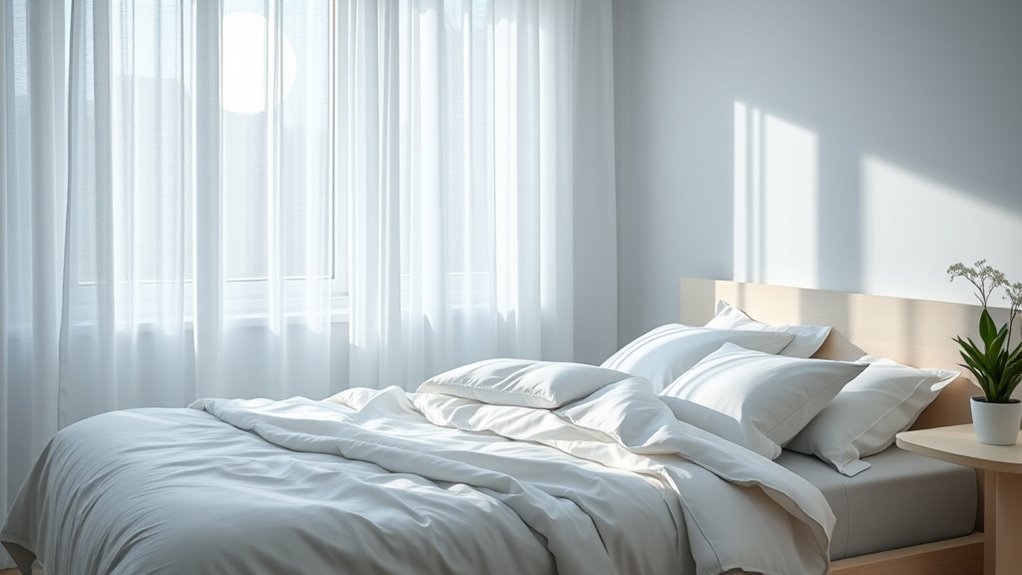
Creating a cool and comfortable sleep environment starts with optimizing your bedroom ventilation to keep the air fresh and circulating. Using cooling sleep accessories like fans or cooling pads can help regulate your body temperature throughout the night. By combining these strategies, you can reduce night sweats and improve your overall sleep quality. Incorporating air quality maintenance and data-driven strategies can also help identify the most effective methods for your personal needs. Additionally, exploring AI discoveries in healthcare might offer innovative solutions to manage symptoms related to night sweats more effectively. Understanding the importance of top-rated products can further enhance your sleep setup and comfort.
Optimize Bedroom Ventilation
Optimizing your bedroom ventilation is essential for creating a cool and comfortable sleep environment, especially if night sweats are disrupting your rest. Good airflow helps maintain a stable temperature around 65°F (18.3°C) and reduces humidity, which can worsen sweating. You can improve ventilation by opening windows or using fans to promote airflow. Air conditioning also helps regulate both temperature and humidity levels. Installing mechanical ventilation systems or using whole-house fans increases air exchange efficiently. Strategic window placement maximizes airflow, while proper ventilation reduces carbon dioxide buildup that can disturb sleep. Proper ventilation and air circulation are key to preventing stagnant air and maintaining optimal indoor air quality, further enhancing sleep comfort. Enhanced airflow not only keeps the room cooler but also supports deeper, more restful sleep. Additionally, proper ventilation can help reduce home energy consumption by decreasing the need for air conditioning, which saves energy and lowers utility bills. Incorporating automated ventilation controls can optimize air exchange based on occupancy and indoor conditions, leading to more consistent comfort. Ensuring that ventilation systems are properly maintained and functioning efficiently can further improve overall air quality. Prioritizing ventilation creates a healthier environment, decreases night sweat episodes, and improves your overall sleep quality.
Use Cooling Sleep Accessories
Using cooling sleep accessories can substantially enhance your comfort by directly addressing overheating issues during the night. Cooling pillows with breathable, perforated foams dissipate heat from your head and neck, helping you stay cooler longer. Some feature layered foam support combined with cooling covers or embedded bands for added heat wicking. Gel-infused pillowcases maintain a cool surface throughout the night without flipping. Cooling socks with gel inserts provide targeted relief for sweaty feet, while cooling sprays or facial mists offer quick, soothing relief on the skin. Bed cooling devices like fans circulate air beneath your bedding, creating a cooler microclimate. Advanced systems such as BedJet actively regulate temperature and moisture, reducing night sweats and improving sleep quality. Proper air circulation is essential for maintaining an optimal sleep environment and preventing heat buildup. Incorporating these accessories can make a noticeable difference in your comfort. Additionally, choosing an air purifier with HEPA filtration can help remove allergens and pollutants that may contribute to night sweats, promoting a healthier sleep environment. Moreover, selecting sustainable materials for your sleep accessories can support eco-friendly choices and improve overall health, especially considering the importance of security concerns related to new device standards. Ensuring your sleep environment maintains optimal temperature can further reduce the frequency and severity of night sweats.
Dietary Choices to Reduce Night Sweats
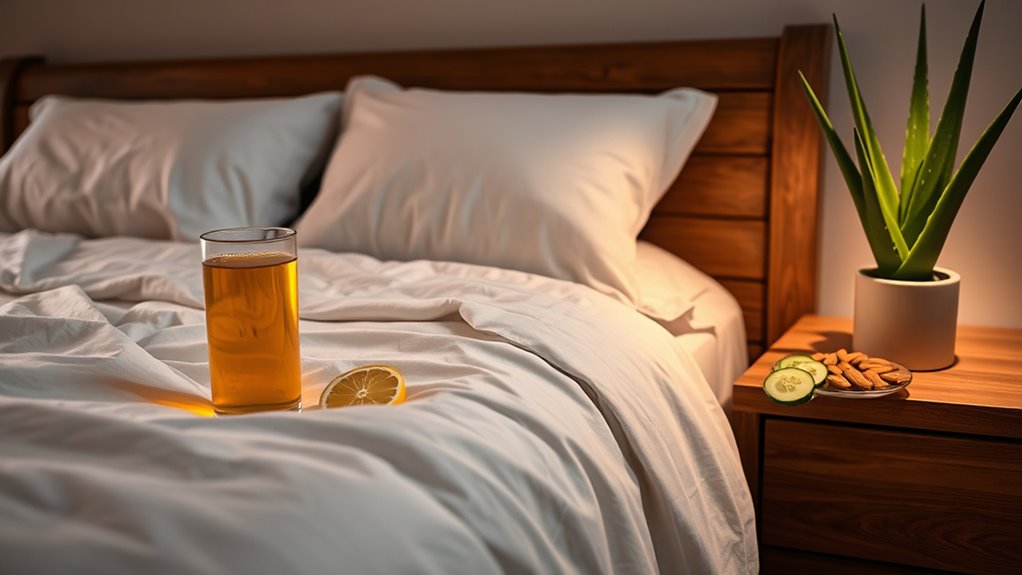
Choosing the right dietary choices can substantially reduce night sweats by balancing hormones and stabilizing blood sugar levels. Incorporate plant-based foods, especially soy, which can lower hot flashes by up to 84%. A Mediterranean-style diet also decreases vasomotor symptoms like night sweats. Focus on fruit-rich diets and whole grains to help regulate blood sugar, reducing symptom frequency. Avoid high-fat diets, as they’re linked to increased vasomotor symptoms. Foods high in vitamin E, such as almonds and sunflower seeds, can help ease hot flashes, while soy isoflavones may further reduce symptoms. Including healthy fats from avocados supports overall health. Additionally, choosing butter alternatives like plant-based spreads can contribute to a heart-healthy diet and reduce inflammation. Incorporating hormonal balance strategies through diet can further enhance symptom management. Consuming nutrient-rich foods can support overall well-being and improve hormonal health. Maintaining a balanced intake of nutrients and understanding their role in hormonal health can lead to better symptom control. Incorporating a variety of anti-inflammatory foods may also help decrease symptoms related to inflammation and hormonal fluctuations. By making these dietary adjustments—adding more fruits, whole grains, and plant-based proteins—you can better manage night sweats naturally.
Incorporating Exercise and Relaxation Techniques
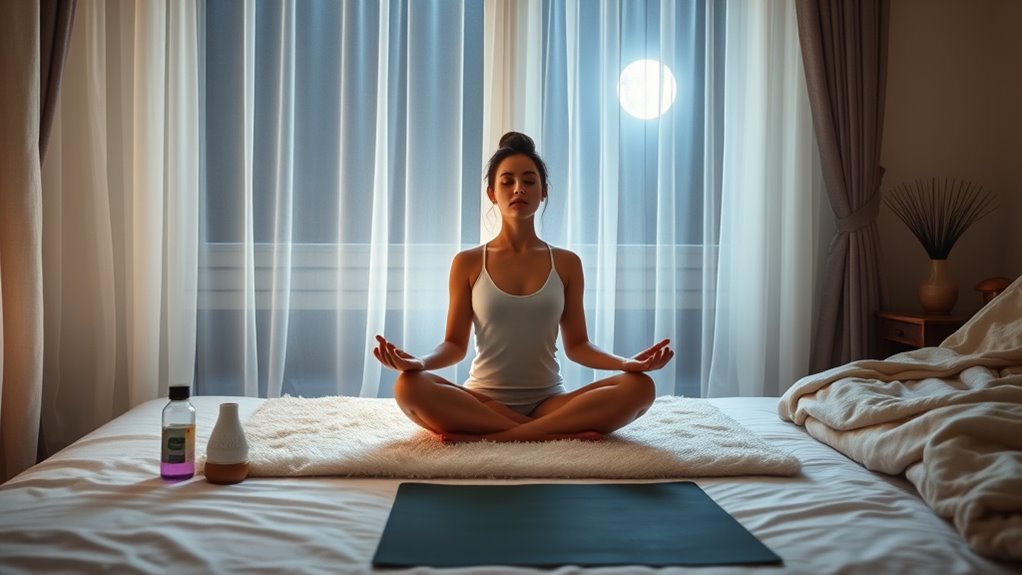
Incorporating gentle yoga practices and stress-reducing breathing into your routine can help manage night sweats by promoting relaxation and better thermoregulation. These techniques are easy to fit into daily schedules and can lower your overall stress levels, which often worsen menopausal symptoms. Meditation can be particularly effective in calming the mind and body, further supporting sleep quality. Additionally, understanding the risks associated with new payment technologies can help you avoid potential pitfalls if you decide to adopt modern merchant services. Regular practice of mindfulness exercises can further enhance your ability to manage stress and improve sleep quality, contributing to fewer night sweats. Incorporating natural bedroom elements such as calming colors and textures can also promote a peaceful environment conducive to restful sleep. Ensuring proper heat pump efficiency in your home can also help maintain a comfortable temperature, reducing night sweats caused by temperature fluctuations.
Gentle Yoga Practices
Gentle yoga practices offer a natural way to ease night sweats by calming your nervous system and reducing stress. Specific poses, like Horse’s Pose, Cat/Cow, Marichi’s Pose, Head-to-Knee Forward Bend, and Shoulderstand, target relaxation and temperature regulation. These poses improve circulation, digestion, and flexibility, helping you manage stress levels that trigger night sweats. Incorporating props and steady breathwork enhances comfort, making it easier to relax deeply. Regular practice not only reduces hot flashes but also improves sleep quality and mood. Yoga’s holistic approach supports overall well-being, making it easier to control symptoms naturally. Additionally, focusing on pressure relief during practice can further enhance comfort and relaxation.
Stress-Reducing Breathing
Have you ever noticed how a few deep breaths can instantly reduce your stress? Incorporating stress-reducing breathing techniques into your routine can markedly lower anxiety and improve your mood. Practices like diaphragmatic breathing activate your parasympathetic nervous system, helping you relax. Techniques such as cyclic sighing and box breathing can also decrease blood pressure and cortisol levels, boosting your emotional resilience. Combining these exercises with physical activity enhances their benefits—using breathing to relax before workouts or recover afterward. Regular, structured sessions of at least five minutes help you build long-term stress resilience. Avoid rapid breathing, as it’s less effective. By consistently practicing mindful breathing, you strengthen your nervous system, reduce physiological arousal, and create a calm, focused mind—benefits that support managing night sweats naturally.
Herbal Supplements for Symptom Relief
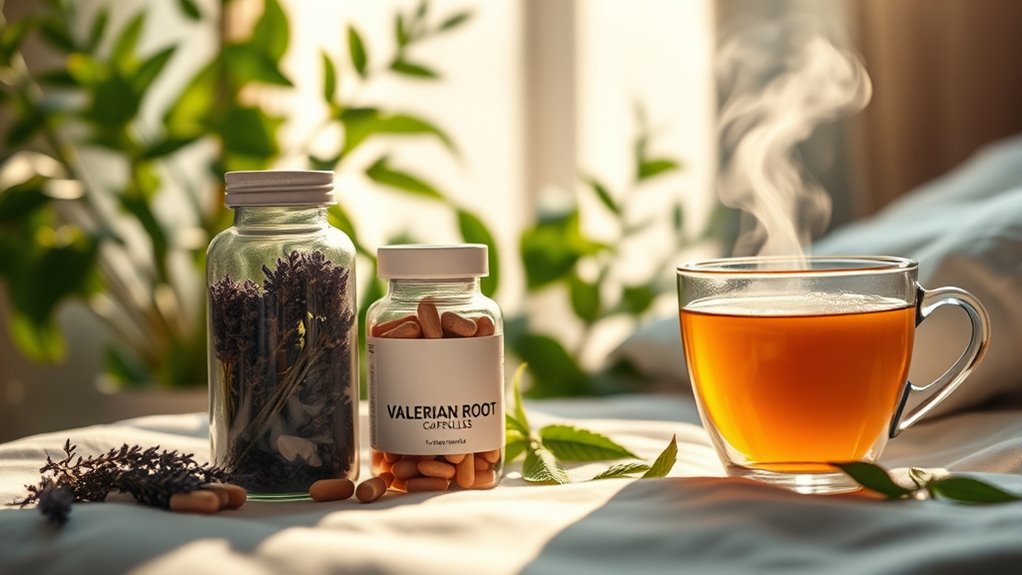
Are herbal supplements an effective way to manage night sweats naturally? They can provide some relief, but results vary. Here are four options to ponder:
- Black Cohosh – Commonly used for menopausal symptoms, it may reduce night sweats, but studies show mixed results and caution those with liver issues.
- Red Clover – Contains phytoestrogens that might help, especially post-menopause, but clinical evidence is limited.
- Flaxseed – Offers lignans and omega-3s that support hormone balance; some women find relief, though research is inconsistent.
- St John’s Wort – Primarily boosts mood, and while it’s sometimes combined with other herbs, its direct effect on night sweats isn’t well-established. Always consult a healthcare provider before use.
Hydration and Fluid Management During the Night

To manage night sweats effectively, you need to time your fluid intake wisely, drinking enough during the day and avoiding large amounts before bed. Choosing cooling beverages, like water or herbal teas, can help keep your body temperature down, while avoiding dehydrating drinks such as alcohol and caffeine is essential. Focusing on proper hydration strategies supports better sleep and reduces night sweats.
Optimal Fluid Intake Timing
Timing your fluid intake strategically can considerably reduce night sweats and improve sleep quality. To do this effectively, consider these key tips:
- Hydrate Early: Aim to consume at least two-thirds of your daily fluids before dinner, reducing the need to wake up for bathroom trips.
- Limit Diuretics: Avoid caffeine and alcohol in the hours before bed, as they increase urination and dehydration.
- Balance Intake: Drink enough fluids to stay hydrated without overdoing it, which can lead to frequent awakenings.
- Pre-Hydrate: Incorporate hydrating foods and drinks earlier in the evening to maintain hydration levels throughout the night.
Proper timing helps prevent dehydration and minimizes disruptive bathroom visits, promoting more restful sleep.
Choosing Cooling Beverages
Have you considered how the temperature of your beverages can influence night sweats? Cold drinks, especially around 5°C, can reduce sweating by aiding thermoregulation. They act as heat sinks, helping your body cool down faster. Replenishing electrolytes with cold water or electrolyte drinks supports fluid balance and speeds rehydration. Choosing the right beverages prevents dehydration and helps maintain a steady core temperature during sleep.
Here’s a quick comparison:
| Cold Beverages | Warm Beverages |
|---|---|
| Reduce sweating | Can increase body heat |
| Aid rapid hydration | Less effective for cooling |
| Replenish electrolytes | May cause dehydration |
| Support core temperature | Less supportive in thermoregulation |
Opt for cold drinks before bed to help manage night sweats effectively.
Avoiding Dehydrating Drinks
Choosing the right beverages before and during the night can considerably impact your chances of experiencing night sweats. Avoiding dehydrating drinks helps maintain proper hydration and keeps body temperature stable. Here are four drinks to steer clear of:
- Sugary beverages like sodas and fruit juices, which increase dehydration due to high sugar levels.
- Caffeinated drinks such as coffee and energy drinks, as caffeine acts as a diuretic and can dehydrate you.
- Alcohol, which disrupts hydration and can cause your body to lose fluids.
- Sodium-rich drinks like sports drinks with high sodium, leading to water retention and dehydration.
Instead, opt for water or electrolyte-rich beverages. Staying well-hydrated supports better temperature regulation and reduces night sweats.
Lifestyle Adjustments to Minimize Triggers
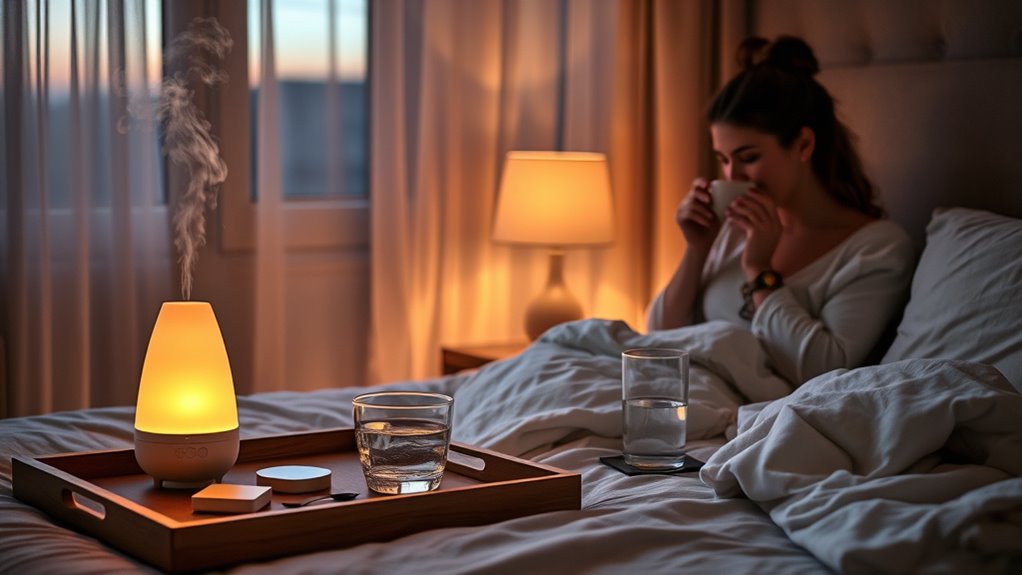
Creating an ideal sleep environment and making mindful lifestyle choices can substantially diminish night sweats. Start by keeping your bedroom cool; setting the thermostat lower or using fans and air conditioning improves airflow and helps regulate your body temperature. Guarantee your sleeping area is quiet and free of clutter to promote better sleep quality. Dimming the lights in the evening can also help your body prepare for rest. Additionally, avoid heavy meals, spicy foods, and hot showers close to bedtime, as these can raise your core temperature. Managing stress through relaxation techniques like meditation or deep breathing can prevent stress-related sweating. Maintaining a healthy weight and staying consistent with your sleep schedule further support your efforts to reduce night sweats naturally.
Clothing and Bedding Tips for Better Sleep Comfort
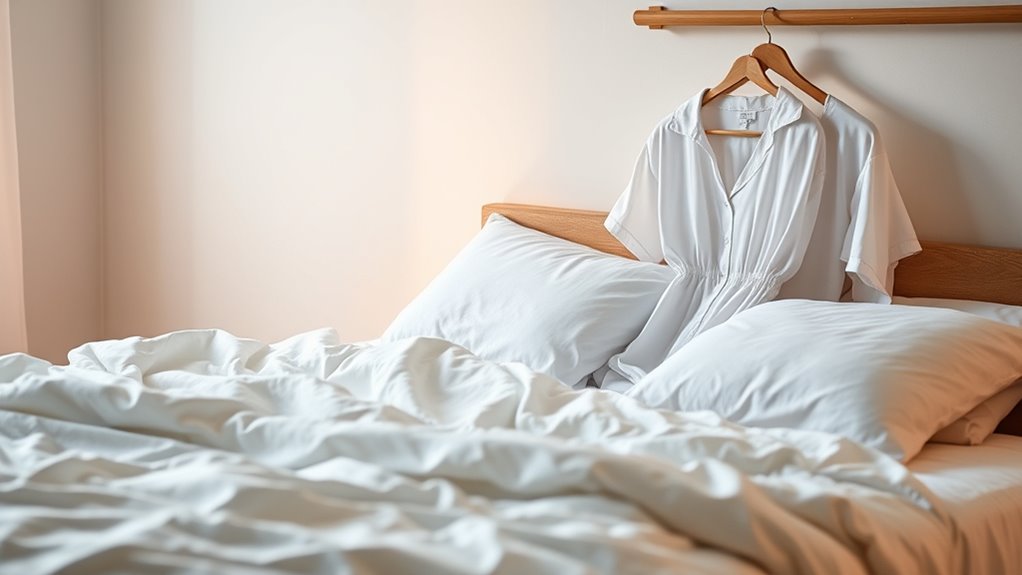
Optimizing your sleep comfort involves selecting the right clothing and bedding that help manage night sweats. Here are four effective tips:
- Choose lightweight, breathable fabrics like bamboo jersey or silk-based pajamas for moisture-wicking and quick-drying comfort.
- Opt for natural fibers such as cotton or linen in your bedding, which help regulate temperature and promote airflow.
- Incorporate sweat-wicking technology in your sleepwear and bedding to manage moisture more efficiently.
- Wear loose-fitting clothing and open-necked shirts to improve ventilation and reduce overheating.
Nutritional Strategies for Hormonal Balance
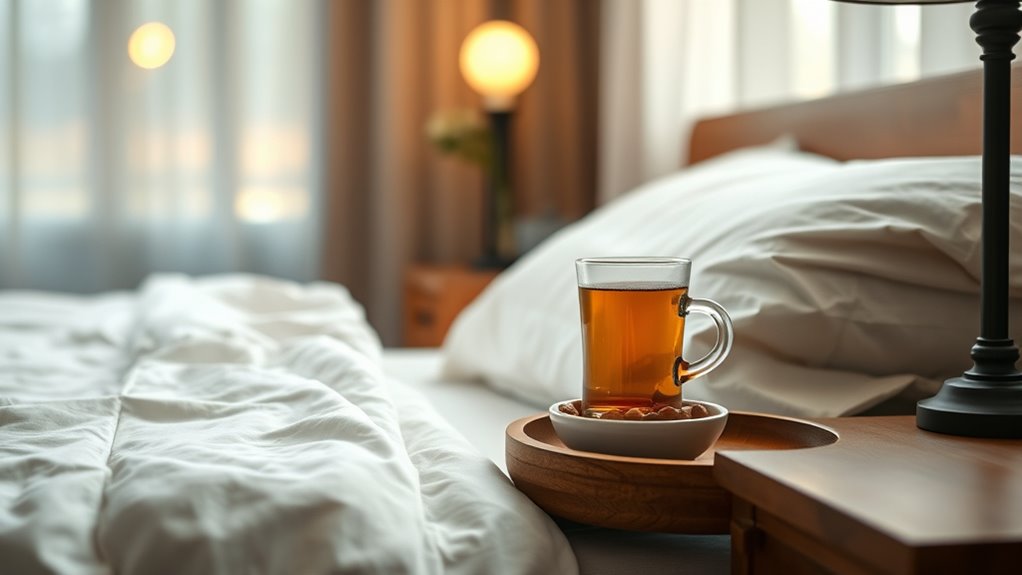
Maintaining hormonal balance during menopause can be supported through targeted nutritional strategies. Incorporate omega-3-rich foods like salmon and sardines to help reduce hot flashes and night sweats. Following a Mediterranean diet, filled with plant-based foods and healthy fats, can cut hot flashes by 20%. Include soy products such as tofu and tempeh, which contain isoflavones that mimic estrogen and may ease symptoms. Add flaxseed, a source of lignans, to your diet for mild menopause symptom relief. Opt for vitamin E-rich foods like almonds and sunflower seeds to help lessen hot flushes. Eating a variety of phytoestrogen-rich foods—broccoli, legumes, oranges—can support hormonal stability. Maintaining a balanced, fiber-rich diet and staying well-hydrated also play crucial roles in managing night sweats naturally.
Combining Natural Methods for Effective Night Sweat Management
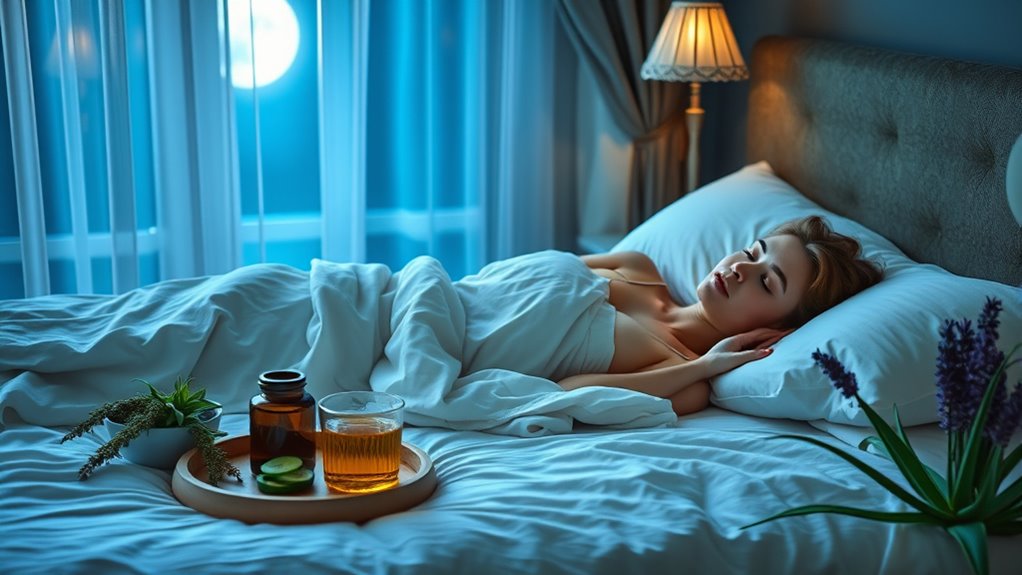
Combining natural methods offers a thorough approach to managing night sweats effectively. By integrating lifestyle adjustments, herbal supplements, exercise, and relaxation techniques, you can create a personalized plan that addresses multiple triggers. Here are four strategies to get started:
1. Dress in Layers and Keep Your Room Cool
Easily removable clothing and a cool environment help regulate body temperature during hot flashes.
2. Practice Stress-Reducing Activities
Incorporate meditation, deep breathing, or yoga to lower stress levels that may trigger night sweats.
3. Use Herbal Supplements Wisely
Consider black cohosh or evening primrose oil to support hormonal balance, but consult your healthcare provider first.
4. Stay Hydrated and Avoid Triggers
Drink cold fluids and steer clear of spicy foods, caffeine, and alcohol to reduce severity and frequency.
Frequently Asked Questions
Are Natural Remedies Safe for Long-Term Use?
You might wonder if natural remedies are safe long-term. Generally, lifestyle changes like keeping your environment cool, staying hydrated, and eating soy products are safe and sustainable. Herbs like black cohosh can be used short-term but need medical supervision for long-term use due to limited safety data. Always consult your healthcare provider before making lasting changes or adding new supplements to guarantee they suit your health needs.
Can Lifestyle Changes Completely Eliminate Night Sweats?
You wonder if lifestyle changes can completely eliminate night sweats. While they can markedly reduce the frequency and severity, they might not fully eliminate all episodes, especially if underlying conditions exist. Adopting healthy habits like maintaining a cool sleep environment, managing stress, and eating a balanced, plant-based diet can make a big difference. However, for some, additional medical treatment may be necessary to fully control night sweats.
Which Herbal Supplements Have the Strongest Evidence for Relief?
Ah, the quest for the legendary herbal miracle! You’ll find black cohosh and Menohelp shine brightest, backed by solid studies showing they reduce night sweats effectively. Soy extract and evening primrose oil also offer some relief, though evidence varies. So, if you want herbal allies with real promise, focus on black cohosh or Menohelp—nature’s proven remedies for those restless nights.
How Do Hormonal Changes Affect Night Sweat Severity?
Hormonal changes, especially declines in estrogen and progesterone, disrupt your body’s temperature regulation. You might notice your hypothalamus becomes overly sensitive, triggering sweating even when you’re not hot. These fluctuations, common during menopause, perimenopause, or postpartum, cause your body to misinterpret normal temperature signals, leading to night sweats. The severity varies based on hormone levels, with rapid drops often resulting in more intense episodes, especially during sleep.
Are There Specific Foods That Trigger or Reduce Night Sweats?
You might notice certain foods trigger night sweats, like alcohol, caffeine, spicy dishes, and high-sugar processed foods, because they affect your body’s temperature regulation and inflammation. To help reduce night sweats, focus on eating more fruits, vegetables, healthy fats, and whole grains. Staying hydrated and avoiding triggers before bed can also make a difference. Keep track of your foods and symptoms to find what works best for you.
Conclusion
By embracing natural remedies, you can find relief from night sweats without the side effects of medication. While creating a cool sleep environment and adjusting your diet help, don’t forget that relaxation and lifestyle changes are equally essential. It’s a delicate balance—like whispering calm into a storm—showing that managing night sweats isn’t just about what you do, but how you approach your well-being with patience and consistency.









